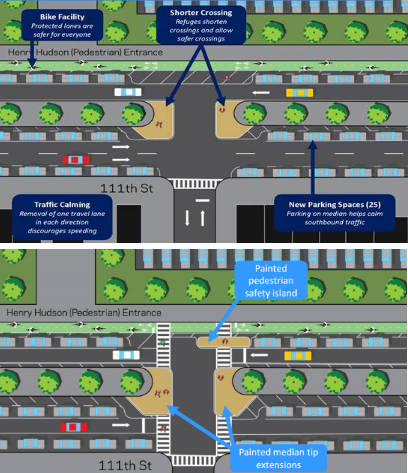
DOT has released a watered-down version of its redesign for 111th Street in Corona. The compromise has won over Assembly Member Francisco Moya, who had withheld his support for the original plan, saying 111th Street needed to retain more car lanes.

The new design will not be as safe to cross as the original proposal. Instead of one southbound moving lane, the compromise plan calls for two southbound lanes. It does not include four painted crosswalks in the original plan. The new design maintains the two-way protected bike lane along Flushing Meadows Corona Park.
Currently, 111th Street has two northbound and three southbound car lanes, leading to high traffic speeds. From 2010 to 2014, 23 pedestrians, 24 cyclists, and 92 motor vehicle occupants were injured on 111th Street, and the main goal of the project is to provide safer access to the park for people walking and biking from nearby neighborhoods. The compromise design will improve on the status quo but won't be as safe as DOT's original plan.
Moya staked his opposition on the argument that there's too much traffic on 111th Street to narrow it, particularly during sporting events at nearby Citi Field and Arthur Ashe Stadium. But a DOT analysis concluded that the street could handle current traffic volumes with only one lane in each direction, and volunteers shot video during last October's World Series games confirming that there just isn't much traffic, even during huge events.
The coalition of advocates and community groups that supported the original plan is backing DOT's compromise plan, as are Council Member Julissa Ferreras-Copeland and Queens Democratic Party Chair Joe Crowley.
Earlier this month, Ferreras-Copeland, who set aside $2.7 million for the plan two years ago, led a rally on the steps of City Hall to demand Mayor de Blasio move forward with the plan, frustrated by the lack of action. Her spokesperson Lillian Zepeda told Streetsblog that Ferreras-Copeland would "definitely continue to fight for" more crosswalks along the corridor.
DOT still plans to present the new proposal to Community Board 4, which failed to advance the previous version. Mayor de Blasio can move forward with the plan regardless, as he did when CB 4 rejected phase two of DOT's Queens Boulevard redesign earlier this year.
Although the compromises to satisfy Moya will weaken the plan, advocates who have pushed for a safer 111th Street for two years celebrated the news that the project will move forward. "These changes are about our children having a better future and about us, as women and as mothers, having the right to feel protected as we move through our streets and into our park," said Veronica Ramirez and Valeria Librada of the Mujeres en Movimiento Collective. "This was more than a safety campaign for us, this was a political education about being at the table for the changes that are possible in our communities."





